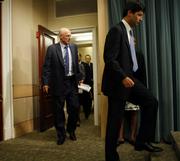LOS CABOS, Mexico (AP) - With major European economies on the brink of collapse, world leaders concluding an annual Group of 20 meeting were left Tuesday with two different paths to ease the financial crisis: Spend more to try to stimulate growth or slash budgets in a bid to restore investor confidence.
For months, that dilemma has loomed over governments and economists as they struggled to put out a debt-fueled economic wildfire that has threatened banks, wiped out jobs and toppled governments all over Europe. But on Tuesday, presidents and prime ministers meeting in this seaside resort seemed content to delay any decision for a while longer, at least according to a draft statement leaked ahead of the G-20's conclusion.
Still, the battle lines in the stimulus versus austerity debate were clearly drawn among the 24 heads of state gathered in a heavily guarded convention hall lined by a moat. The conservative leaders of the United Kingdom, South Korea and Germany came out decisively for austerity, warning that budget cuts were crucial to restoring fiscal order and worldwide confidence.
"The countries in crisis will have to find measures that might be painful and politically unpopular in the short term, but nonetheless they must pursue this path," South Korean President Lee Myung-bak said Monday.
On the other side were left-leaning governments such as those in Argentina, Brazil and France that have denounced the German-imposed austerity plan for struggling countries such as Spain and Greece and pushed for more stimulus spending.
After Argentine President Cristina Fernandez met with her Brazilian counterpart, Dilma Rousseff, the two sides were united in their opposition to the existing bailout plan.
"At the same time, they agree that we need to listen to Europe, especially to Germany, to see what measures it proposes to exit the euro crisis," Argentine Foreign Minister Hector Timerman said.
President Barack Obama did not take a clear stand on the issue while speaking briefly to reporters Monday, pledging only to work "hand-in-hand to both grow the economy and create jobs while taking a responsible approach."
The draft statement, which could still change before a final version is released later Tuesday, stops short of committing the nations to greater spending unless conditions worsen. The draft urges fiscal responsibility while looking to education, innovation and infrastructure investment to spur economies.
Such fence-sitting is typical of G-20 declarations, said Jacob Kirkegaard, a research fellow at the Washington-based Peterson Institute for International Economics. The specifics of any economic plan will likely be negotiated at a European Union summit to be held next week, he said.
"On the big issue of the hour, of weeks and months, the G-20 communique is not going to make a big difference," Kirkegaard said. "The communique will repeat the mantra about strong, balanced, global growth. With each member state free to do whatever they want, that's the way to paper over those differences."
Indeed, the statement's reassuring words failed to sooth troubled world stock markets, which remained mixed and nervous Tuesday.
Germany must shoulder a large share of the contributions to bail out economically weaker European countries that overspent for years. In exchange, Germany has been insisting on steep cutbacks from aid recipients such as Greece.
Those cutbacks have led to dramatic economic hardship for voters in Greece and other countries. A growing number of European countries have been advocating spending and growth, not austerity, and the G-20 statement made limited mention of such a possibility.
"We are united in our resolve to promote growth and jobs," the draft says, declaring the leaders will announce the "coordinated Los Cabos Growth and Jobs Action Plan" to achieve those goals, although the draft does not provide details of the plan.
"Strong sustainable and balanced growth remains the top priority of the G20, as it leads to higher job creation and increases the welfare of people across the world," the statement reads.
It specifically supports greater government spending in countries that can afford it if conditions get significantly worse, saying countries with "sufficient fiscal space stand ready to coordinate and implement discretionary fiscal actions to support domestic demand."
The plan also hints at flexibility by asking that governments "take into account evolving economic conditions," which could open the way for more latitude in troubled countries such as Greece.
The draft plan also says the Obama administration pledged to prevent sharp tax increases and government spending cuts from kicking in at the end of the year, as scheduled under current law, to avoid sending the U.S. into another recession.

